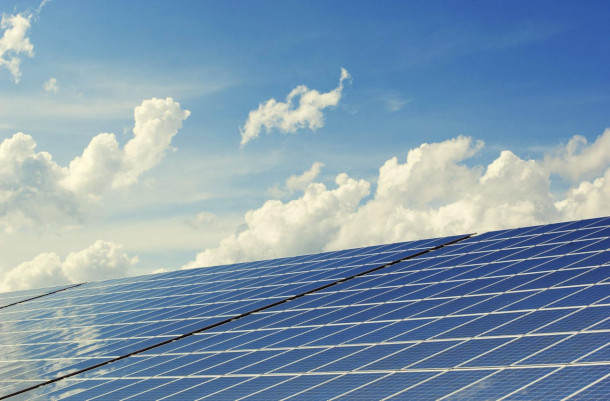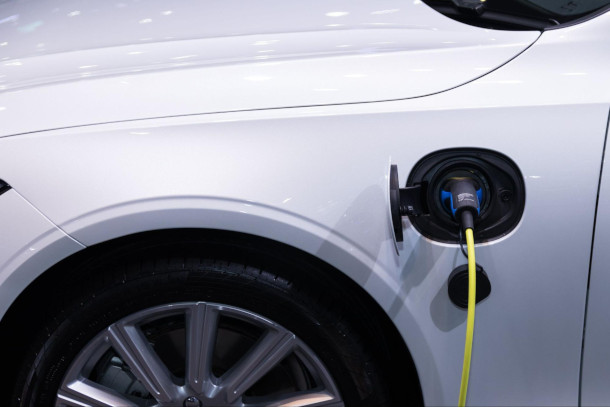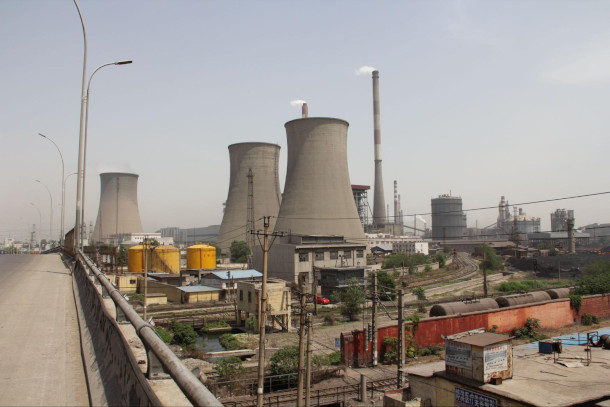Renewable Power Surge in China
Air Date: Week of February 2, 2024

In 2023, China commissioned as much solar energy as the entire world did in the previous year. (Photo: Pixabay, Pexels)
China surged ahead of other countries in 2023 to add 66% more wind power than it had before and bring online as much solar energy as the entire world had developed in 2022. Isabel Hilton, founder of China Dialogue, joins Host Aynsley O’Neill to examine the geopolitical and economic implications of China’s dominance in the renewable energy sector.
Transcript
O’NEILL: At the COP28 climate summit in Dubai, countries set a goal to triple global renewable energy capacity by 2030. It’s an ambitious target but in a new report the International Energy Agency, or IEA, says we’ve got a good shot of reaching it. Global renewables capacity grew 50% in 2023 to more than 500 gigawatts. And the main driver of that growth is China. Last year China surged ahead of other countries, adding 66% more wind power than it had before and bringing online as much solar energy as the entire world had developed in 2022. Isabel Hilton is founder of the China Dialogue group and a non-executive director of E3G, a climate think tank. She’s here now to speak with us about the implications of China’s dominance in the renewable energy sector. Welcome back to Living on Earth, Isabel!
HILTON: It's a real pleasure to be here, Aynsley. Thank you for having me.
O'NEILL: What sort of advantages does China have that's allowing them to produce this renewable energy at such an incredible scale?
HILTON: China is just the world's biggest industrial economy. And it has built up a capacity for producing extremely efficiently, for organizing supply chains extremely efficiently. It still has relatively low labor costs, and it is moving to very high rates of automation. The other thing I think that helps China to keep its costs down is that it's producing at scale for a very large domestic market and then an export market. China is building absolutely enormous industrial scale, utility scale, solar parks in the western deserts. They will have a capacity equivalent to two or three times the Three Gorges Dam when completed, for example. Not that many Western companies produce at that scale in that sector. And that's, you know, because China invested nearly 20 years ago and has built up its capacity since. So it's very hard to challenge it.

China dominates the supply chain of many renewable technologies, including electric vehicles. (Photo: Rathaphon Nanthapreecha, Pexels)
O'NEILL: So China is seeing such success in increasing their renewable sector. What does that mean for the rest of the world's economy?
HILTON: The problem is that it has gone to a level of dominance that this is felt to threaten the industrial economies of other G20 countries. There's a particular concern in the European Union about government subsidies in China, which are undermining the capacity of European companies to compete. And if you don't challenge that, as a trading practice, then every advanced industrial economy risks losing its own sector. We saw it in the past in solar panels, we're seeing it now, and this is going to be quite a big one, in electric vehicles. We have to move transport, essentially, to electric vehicles. The problem is that China is producing very good electric vehicles around 10,000 euros cheaper than a European manufacturer. And that's a massive price difference. Now, in a world where you're only thinking about climate, you would say, that's great, you know, let all those cars come into the European market. But if you look at the importance of the car industry, in the European market, so particularly in Germany, but also in Slovakia, in the Slovak Republic, for example, where there's a significant car industry and all the supply chains that feed that car industry, then you have a serious problem. You know, if that was to be undermined by cheap Chinese vehicles, you would get political backlash, economic downturn, you'd get a lot of unrest and unhappiness. So managing this is going to be the challenge of the year.

China is still building coal-fired power plants, despite its simultaneous massive rollout of renewables. (Photo: V.T. Polywada, Flickr, CC BY-NC-ND 2.0)
O'NEILL: Well so what about some of these other global superpowers, the EU, the United States? How are they responding to China's progress and the global surge towards renewable energy?
HILTON: Well, the G20 economies are responsible for most of the emissions. But the good news is that the European Union and the United States both have strong policy commitments now to the energy transition. So the IRA in the United States is really important. And Europe has had a whole series of very important policy initiatives around a green transition. I think, though, that both in the European Union and in the United States, there is some concern about political opposition to the transition. The US election, for example, in November, where Donald Trump to come back, he has threatened to leave the Paris Agreement again, and to you know, drill for yet more oil. So that's discouraging. But, you know, the commitment, I think, still in Europe to the Paris Agreement and to the goals set, after the global stock take is pretty solid. And Europe could meet that tripling target, but it would depend slightly on there being no political obstacles or no political setbacks.
O'NEILL: What's the outlook in China right now? How are they faring in terms of, you know, obstacles that they might be facing? How's their economy doing? What's next after this scaling up all in terms of renewables?

Above, a vent stack at a gas processing station; gas is mostly made of methane, a powerful greenhouse gas. Reducing methane emissions now can have a significant benefit for the climate. (Photo: Clean Air Task Force, Flickr, CC BY 2.0)
HILTON: The economy in general is not doing terribly well in China, and it's overshadowed by the slow-motion collapse of a very, very large property sector. China's also hitting some trade obstacles with the United States, with the European Union. And China's ambition to transfer from an export-oriented, investment- heavy economy to one that's far more consumer-led hasn't really worked because people's incomes haven't gone up enough. There's a lot of uncertainty following COVID. So people in China are just not spending the way they would need to to sustain the Chinese economy as substantially a consumer and service based economy. So we're still seeing a lot of investment in industrial capacity. And that's feeding into the problem we just discussed, which is overproduction of lots of renewable technologies, which are then going to be dumped on global markets and cause further trade friction. That's a big problem. The other problem in terms of Chinese mitigation, so that's reducing emissions, is a question of energy security. Because we're in an age of geopolitical tensions, security has come right up the agenda for China and energy security is a concern because every fossil fuel that China consumes except for coal has to be imported. And although China has increased its imports of both oil and gas from Russia, there is still a concern about were the security situation to deteriorate further, China likes to have a kind of domestic fuel to fall back on. And unfortunately, that tends to be coal. So we're still seeing in China more building of coal fired power stations. But fortunately, the dial is moving towards the more positive side. You know, when you look at who is likely to be able to meet that tripling of renewable capacity by 2030, China's well ahead. China would have no great trouble meeting that goal.
O'NEILL: Isabel, despite this good news about the world possibly being on track to meet the UN agreed target of tripling renewables by 2030, the IEA has warned that the goal still isn't going to be enough to keep warming under 1.5 degrees Celsius above the preindustrial levels that we're looking for. What needs to be done in order to push beyond what we previously thought was possible, in terms of this renewable energy capacity?

Isabel Hilton is the founder of the China Dialogue group and a non-executive director of E3G, a climate think tank. (Photo: Anne Heslop)
HILTON: I think you probably have to look at it from two dimensions. We are still emitting an awful lot of carbon and methane. We can buy ourselves a bit of time by cutting way back on methane emissions. And that was a concern at the last Conference of the Parties. And we have seen a number of countries sign up to a methane pledge. The point about methane is that it's a relatively short-lived greenhouse gas, so that if you reduce levels of emission now, you do get a benefit within a decade, whereas with carbon, it takes 100, 200 years to see the benefit of reducing emissions now. The second thing, of course, is to reduce all emissions, much faster. Global emissions have not yet peaked. After 30 years of discussing this, we have not peaked our emissions. We really have to move faster on that. So yes, of course, we need to accelerate the deployment of renewable energy, there are a lot of administrative barriers, but that isn't going to do it unless we simultaneously reduce the carbon emissions from all sorts of sectors. It's not rocket science, if you like, but there are a lot of things in the way we have done things in the past that will need to change. And one major thing is finance, you know, getting the World Bank, the multilateral organizations to invest- to stop investing, first in fossil fuels, which banks and multilateral still do. Stop doing that, and just put the money into renewables instead. And finally, there are a lot of countries that have yet to build energy systems. And it's very important that those developing countries, those emerging economies, build renewable systems rather than passing through that phase of heavy fossil-based economies that until relatively recently, we thought was necessary for a developing country to boost its economy. That is no longer the case. But they will need investment and they will need advice and technology in order to do that. But we would certainly avoid another big problem if we manage to do that.
O'NEILL: Isabel Hilton is founder of the China Dialogue group and a non-executive director of E3G, a climate think tank. Isabel, thank you so much for joining me today.
HILTON: It's been a real pleasure, thank you.
Links
The Financial Times | “Renewable Energy Surge of 50% Driven by China, IEA Says”
Living on Earth wants to hear from you!
Living on Earth
62 Calef Highway, Suite 212
Lee, NH 03861
Telephone: 617-287-4121
E-mail: comments@loe.org
Newsletter [Click here]
Donate to Living on Earth!
Living on Earth is an independent media program and relies entirely on contributions from listeners and institutions supporting public service. Please donate now to preserve an independent environmental voice.
NewsletterLiving on Earth offers a weekly delivery of the show's rundown to your mailbox. Sign up for our newsletter today!
 Sailors For The Sea: Be the change you want to sea.
Sailors For The Sea: Be the change you want to sea.
 The Grantham Foundation for the Protection of the Environment: Committed to protecting and improving the health of the global environment.
The Grantham Foundation for the Protection of the Environment: Committed to protecting and improving the health of the global environment.
 Contribute to Living on Earth and receive, as our gift to you, an archival print of one of Mark Seth Lender's extraordinary wildlife photographs. Follow the link to see Mark's current collection of photographs.
Contribute to Living on Earth and receive, as our gift to you, an archival print of one of Mark Seth Lender's extraordinary wildlife photographs. Follow the link to see Mark's current collection of photographs.
 Buy a signed copy of Mark Seth Lender's book Smeagull the Seagull & support Living on Earth
Buy a signed copy of Mark Seth Lender's book Smeagull the Seagull & support Living on Earth

